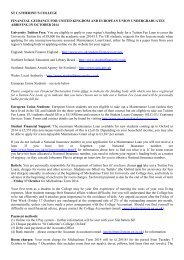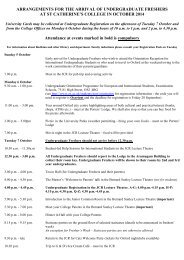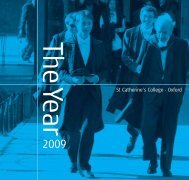Catzeye (Michaelmas 2011) [f]_Layout 1 - St. Catherine's College
Catzeye (Michaelmas 2011) [f]_Layout 1 - St. Catherine's College
Catzeye (Michaelmas 2011) [f]_Layout 1 - St. Catherine's College
Create successful ePaper yourself
Turn your PDF publications into a flip-book with our unique Google optimized e-Paper software.
<strong>College</strong> life<br />
7<br />
K John Simopoulos, Dean<br />
of Degrees and Emeritus<br />
Fellow<br />
CatzEye previews <strong>St</strong><br />
Catherine’s, Oxford: A Pen<br />
Portrait<br />
Excitement continues to build in <strong>College</strong><br />
ahead of the publication of our magnificentlyillustrated<br />
book, <strong>St</strong> Catherine’s, Oxford: A Pen<br />
Portrait. To celebrate its impending release,<br />
we publish one of the essays John<br />
Simopoulos, Dean of Degrees and Emeritus<br />
Fellow, has written for the book.<br />
On Latin and Telephones<br />
Latin is far too good to die completely. You can now<br />
listen to the news in Latin, broadcast from Helsinki<br />
as a podcast about whatever is happening, whether<br />
it’s suicide bombing in Beirut or a pterodactyl<br />
having been discovered in Colombia. And they<br />
make fewer syntactical errors than Radio 4.<br />
I must say I’ve always found Latin useful and not<br />
just for inscriptions or college mottos. I was<br />
working as an unpaid telephone operator in the<br />
Rome International Telephone Exchange — it was<br />
in the days when most calls had to be put<br />
through manually. A call came in from someone in<br />
the Vatican wanting to be put through to<br />
Budapest. I tried Italian on him — no joy. I spoke<br />
to him in French, that didn’t work either. English?<br />
— he replied in German. So then I tried: ‘Loqueris<br />
Latine Domine?’ ‘Ita’, he replied with relief, and<br />
that must be one of the few cases where an<br />
Anglo-Greek Jew puts through a call in Latin for a<br />
Hungarian Cardinal wanting to be connected from<br />
the Vatican to Budapest. It worked rather well.<br />
I also had to speak Latin for prolonged periods<br />
when I was a Special Commissioner for Oxfam<br />
reporting on the plight of Hungarian refugees in<br />
various refugee camps in Italy in the early 50’s<br />
and I had to liaise with Monsignor Anisich who<br />
was Hungarian and there turned out to be no<br />
language that we had in common except Latin; so<br />
we communicated entirely in that language for 3<br />
whole days. It was strenuous as a lingua franca<br />
but quite up to even such a modern task.<br />
On my answering machine in London, I had a<br />
perfectly ordinary message for weekdays and<br />
Saturdays, but on Sunday, if you rang me and got<br />
the answering machine, it would intone: Ave.<br />
Machina locutrix auditrixque sum. Dominus meus<br />
Johannes etiamnunc dormit. Sonitu electronico<br />
audito dic aliquid: pro dis immortalibus noli<br />
tacere! Domine vel domina vale. ■<br />
<strong>St</strong> Catherine’s, Oxford: A Pen Portrait is a<br />
beautifully-illustrated volume, telling the <strong>St</strong><br />
Catherine’s story though contributions like<br />
the one above.<br />
To get your<br />
name printed in<br />
the book’s<br />
Subscriber List<br />
and enjoy a £10<br />
discount, order<br />
before 31<br />
January 2012.


![Catzeye (Michaelmas 2011) [f]_Layout 1 - St. Catherine's College](https://img.yumpu.com/39479724/7/500x640/catzeye-michaelmas-2011-f-layout-1-st-catherines-college.jpg)














